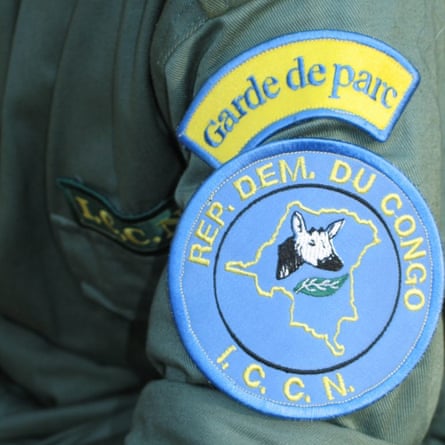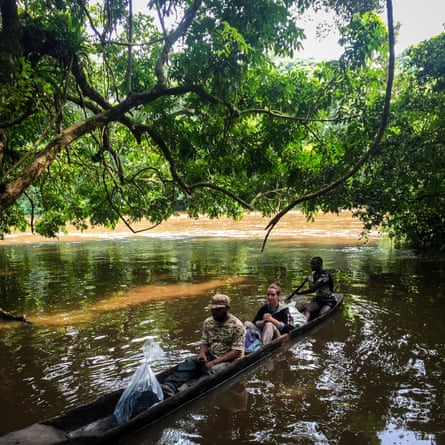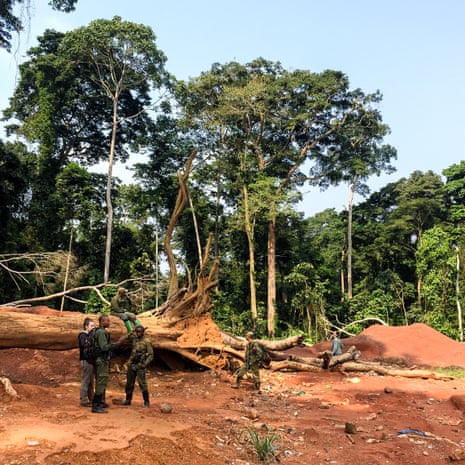Conflict is never far away in the Democratic Republic of Congo – a country rich in natural resources such as gold, diamonds, coltan and tin – and the country is on the brink of a new civil war. Tensions have been rising since December, when President Joseph Kabila postponed the elections.
As the situation gets worse, analysts point to the role of mining in the conflicts. Opposing groups fight for control of the country’s natural resources and use the proceeds to buy weapons in times of uncertainty. And all that is very bad news for the DRC’s precious wildernesses.
This summer we – two Dutch journalists Klaas van Dijken and Lisa Dupuy – travelled to the DRC with the American photographer Adriane Ohanesian to focus on just one of these natural resources, and its part in growing tensions: gold.
As part of a long-term project for Lighthouse Reports and Dutch media, we wanted to report on how gold sparks conflict between nature reserve rangers, militias, the army, illegal miners and local communities, and how this gold connects to the western markets and the luxury products and electronic devices that we buy in the developed world.
We travelled to the north-east of the country, to the Okapi wildlife reserve, an extraordinary world heritage site – and an area rich in gold. The area had not seen large-scale conflict for some years, but we were told it had been under severe threat from local militias in the past and it was believed the region might soon spiral into chaos again.

Our guides in the area would be the nature reserve’s rangers, employed by the Congolese Institute for Conservation (ICCN) and as such count as the legal authorities in the reserve. They were happy to show us the work they were doing, and they assured us that things were calm.
When we asked to travel out from the headquarters in the village of Epulu, it was decided we should accompany a patrol to a former illegal mine, an hour’s drive and five hours’ walk away.
It was cold when we left in the back of a pickup truck on the early morning before the attack, on our way to the footpath that leads to the mining site at Bapela. Thick fog muffled the early morning sounds of the forest. We were with a group of six rangers, two porters, a canoe paddler and our fixer, and our group would be joining the 10 rangers already stationed at the mine.
At the Epulu river, which we had to cross with a small canoe, we saw a flying squirrel leaping between the trees at the water’s edge. There were no signs of the okapi, a shy animal that looks like a mix of giraffe and zebra, which is endemic to the region and after which the reserve is named.
The disastrous impact of illegal mining on the reserve’s ecosystem became clear to us as soon as we reached Bapela. The reddish, cracked soil formed a stark contrast to the jungle’s bright greens. Until March this year, up to 1,500 illegal miners dug for gold here.
The miners yielded about 30kg each week after clearing the area of trees. The site must have looked like a temporary village back then, with bars, shops and brothels. Then in March a group of 12 rangers chased the miners away – a risky task, they admitted, and they now considered this a site of victory.
One of the rangers told us that their ranger outpost at Bapela, strategically built on the hill above the excavated mine, was of crucial importance. “If we stay away for two days, the diggers will return,” said Léopold Gukiya Ngbekusa, 61, who grew up in the rainforest before the reserve even existed.
“My father took me here on the back of an elephant, in 1956,” he said. He became a ranger when the reserve was established in 1992. “Now, the gold just disappears. It is brought to wealthy people who take what they want and leave.”
In a 2016 study, special rapporteurs to the UN described the role of brokers who mix the gold from illegal mines, such as Bapela, with the gold found at legal sites. The gold is then smelted, making it impossible to discern what has come from where. Finally, the gold is sold to companies, including those in the west, to produce luxury goods, jewellery, and electronics.
Ngbekusa told us he wasn’t interested in people buying gold in the west, but he did worry about the weapons that miners were bringing into the forest. Ngbekusa was one of the first rangers killed during the attack the next day.
On the morning of 14 July, the vegetation was steaming as the bright sunlight came piercing through. The early morning had again been chilly but the temperature and humidity were quickly rising. We spent the morning interviewing the rangers and filming the site.
The role of a ranger is one of the few steady job opportunities in the region. Only 120 rangers are responsible for the integrity of the whole reserve which covers more than 13,000 sq km of dense forest. Even in that group, only 70 are fit enough to embark on gruelling and dangerous walking patrols.
At lunchtime we put our gear away and the rangers set aside their weapons and and started cooking rice and beans for lunch. When the sound of gunfire shattered the quiet it looked like the beans were exploding, or that an AK-47 that was toppling out of one of the rangers’ tents had gone off by accident. A second later we realised we were under attack.
Panic erupted and we dove for cover and ran past the bright orange and blue tarps and down the hill on which the temporary outpost had been set up. Our satellite phone was two steps away in the wrong direction. We saw Adriane and our fixer, Horeb Bulambo, sprinting away in a slightly different direction.
We followed three rangers across the excavated mine, passing a ranger firing his weapon from the shoulder uphill, and dashed for for cover in the bush. We heard one of the commanders shouting instructions to his fellow rangers, his voice almost drowned out by the attackers’ sinister screaming and gunfire. The repeating dark dull sound of a machine gun laid a carpet of sound.
As the gunfire stopped, silence fell over the forest. We had no idea what was happening, where the other rangers were, or if Adriane and Horeb were with them.
We crouched in our hiding spot in the bush as tense minute followed tense minute. The silence stretched to half an hour, only to be disturbed by a second barrage of cracks a few metres away. Two rangers moved slowly forward. More gunfire followed and the assailants seemed to be approaching us.
Again we ran, thorns scratching our heads and body. During a quick pause the rangers decided to escort us out and get reinforcements. We were rushed through the jungle, following roughly the same path we had taken 24 hours earlier, telling ourselves this was only right thing to do. As we made our way through the forest, one of the rangers whispered, “Here you have the real story. This is reality for us.”
Without a mobile signal in the rainforest, nobody at the ICCN headquarters knew about the attack. We were the first to reach Epulu. We immediately informed the authorities, but night had fallen and it was now too dangerous for a search and rescue to go into the jungle. Instead a new group of rangers would leave headquarters at first light, accompanied by Congolese army soldiers. Soldiers and rangers have clashed over the natural resources in the reserve in the past, but this was an emergency. Adriane, Horeb and 12 rangers were still missing.
As soldiers and rangers approached Bapela the next day, Horeb and a group of the missing rangers emerged from the jungle. They thought Adriane was with us. “I saw her running just behind you!” shouted Horeb.

By that time governments, embassies and the UN had been informed of the situation but it would take another nerve-wracking 12 hours before Adriane was rescued. She had stayed hidden in a mining pit for almost 20 hours before she was found by the search and rescue team.
Four rangers and a porter died in the attack on Bapela. Their bodies were brought to Epulu two days after the attack on Sunday where their coffins stood waiting. At the edge of the graveyard, a boy stood crying in despair: “Daddy! Daddy! Daddy!”
A week after we left Epulu the missing porter was found. He had been kidnapped and tortured by the attackers, but managed to escape the armed group.
The assailants, 17 in total, had apparently wanted to gain control of the mine. Who they were remains unknown, but the ICCN and the army are conducting investigations. Five suspects have been arrested, but their role in the attack, if any, remains unclear.
Meanwhile the rangers who have regained control of Bapela and soldiers are also present in the jungle. The rangers we are still in touch with tell us that the fight for Okapi’s gold isn’t over and they expect another attack on Bapela soon.
- A note from the authors: Five people, Sudi Koko (born 1992), Antopo Selemani (1970), Patrick Kisembo (1991), Léopold Gukiya Ngbekusa (1956) and Lokana Tingiti, were killed in the 14 July attack on the Bapela mine site in the Okapi wildlife reserve. The rangers’ families receive a pension, but that is not enough to cover social security, school fees and health care. To support these families, visit the donation page for Wildlife Conservation Global. Select the Okapi conservation project as the destination for your donation and use the word “RANGERSUPPORT” in the comments section to indicate that you would like your donation to be put towards the rangers’ families in the Okapi wildlife reserve.
- This year, in collaboration with Global Witness, the Guardian is attempting to record all of the deaths of people who are killed while defending their land, forests, rivers or wildlife – most often against the harmful impacts of industry. We are also documenting the stories of some of the land and environmental defenders still under attack. Read more here: theguardian.com/environment/series/the-defenders
